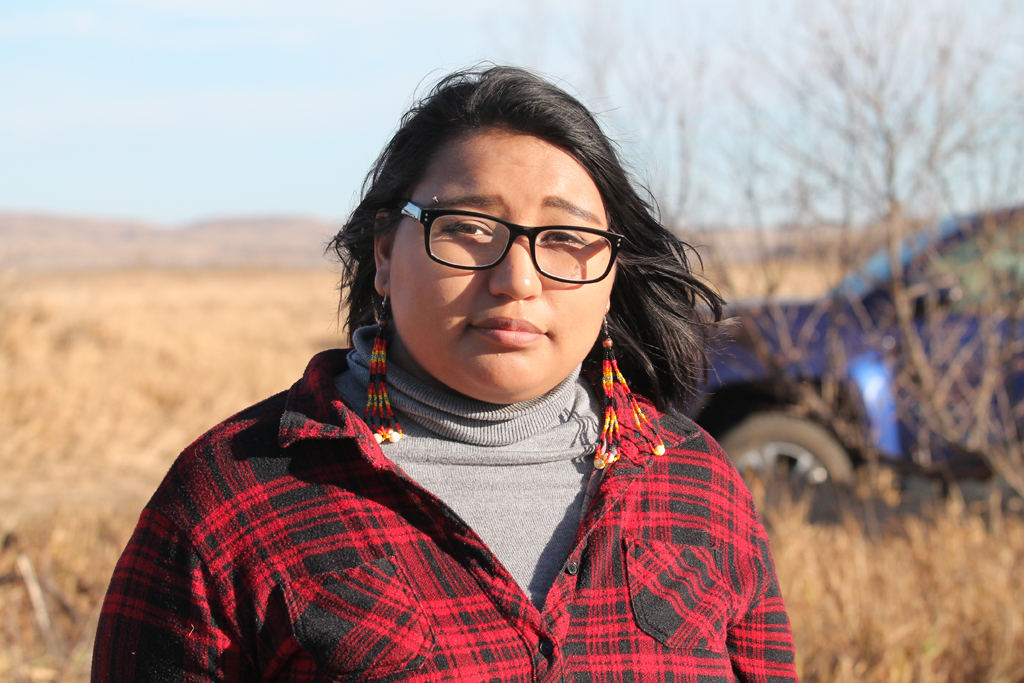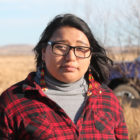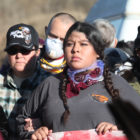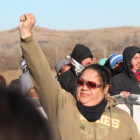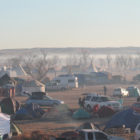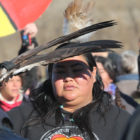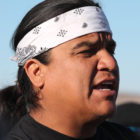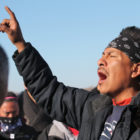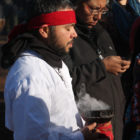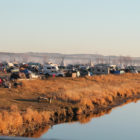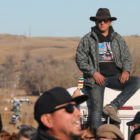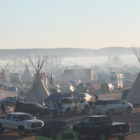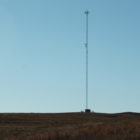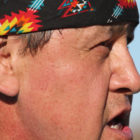OCETI SAKOWIN CAMP, North Dakota — When then-10-year-old Morgan Brings Plenty needed to use the bathroom in her new school, she respectfully asked for permission. But instead of giving her permission, she said the teacher responded by hitting her with a ruler for speaking Lakota, her native language and the only language she knew.
“I was scared — I was the only Native American at that elementary school, and I was hit for speaking my language,” said Brings Plenty, who was in the fifth grade when she moved from the Cheyenne River Reservation in Eagle Butte, South Dakota, to a suburban town in Washington state.
Brings Plenty said she was raised hearing stories about the discrimination her parents and grandparents experienced growing up decades ago, and wants people to know in many ways nothing has changed.
“Some people say that we haven’t experienced what happened in boarding schools, which were 50 to 60 years ago, but there are some things that are happening today,” Brings Plenty said. Beginning in the 1800s, many Native American children were ripped from their families and placed in boarding schools in efforts by the U.S. government to destroy native cultures and language.
Brings Plenty is now a 22-year-old youth leader at Oceti Sakowin, one of five camps that dot the hilly landscape near the Standing Rock Sioux Reservation in North Dakota. Hundreds of tribes and thousands of people are living in teepees and tents in the camps, where they vow to stay until construction of the Dakota Access Pipeline is permanently stopped.
They say the pipeline company, Energy Transfer Partners, is trespassing on treaty land and has disturbed sacred sites. Calling themselves water protectors, they hope to prevent the company from running the pipeline under the nearby Missouri River, a source of drinking water for millions of Americans.
Water protectors, who disrupt construction work using nonviolent direct action — by blocking roadways, obstructing work zones and holding prayer ceremonies — have been met by an increasingly militarized police presence. Since August, hundreds have been arrested by police using rubber bullets and pepper spray, and deploying Long Range Acoustic Devices (LRADs are sound cannons).
The pipeline company and local law enforcement monitor the water protectors and their activities from the air, and protectors say stingray technology is being used to scramble online reception and to quickly drain cellphone batteries. The Morton County Sheriff’s office did not respond to multiple requests for comment. Via email, Energy Transfer Partners said, “Our top priority is safety — the safety of our workers and our assets, the safety of those who live and work in the area and the safety of the environment.”
In the midst of ongoing tension, the smell of campfires, sage and sweetgrass linger in the camp air while children play on bikes and young men practice horsemanship. Tribal flags snap in the fierce North Dakota wind. In anticipation of North Dakota’s notoriously brutal winter, a collective effort is underway to winterize the camp.
Brings Plenty, who is from the Mnicoujou band of the Cheyenne River Sioux, said her experience at school has motivated her to defend her culture.
“I used to hate being who I was and I wanted to change who I was,” she said. “But then I realized I came from a great tribe and a loving, rich culture, and that should be shared with others.
“When I was younger, I’d get in trouble in class because I’d correct the spellings,” Brings Plenty said with a grin, referring to the frequent misspelling of native names in school textbooks. Native history, culture and traditions are often inaccurate or omitted from textbooks. Since then, she’s been involved in the efforts to stop the Keystone XL Pipeline as well as one to save wild buffalo.
She and her family returned to the Cheyenne River Reservation after her eighth grade year, a move she said she feels her family was predestined to make.
“Living on the reservation is like living in a Third World country,” she said, adding that good housing and jobs on the reservation are often hard to find.
“But on the reservation, you’re living with your parents and grandparents, which we don’t mind at all,” said Brings Plenty. “It’s how we were raised up, to help our elders.
“We believe the spirits took us back home to fight these pipelines,” she said, referring to the Dakota Access Pipeline and the Keystone XL Pipeline. Although the southern leg of the Keystone XL pipeline is already complete, the northern leg was rejected by President Barack Obama last year.
Brings Plenty, who has lived at the camp on and off since June, said she’s been involved in some of the peaceful efforts to stop pipeline construction crews but has had to stay back since the police started using the LRADs.
“I have epilepsy, and that noise could cause seizures,” said Brings Plenty, who added that she recently got new medication and earplugs to block the sounds.
Still, she said, there’s plenty to do and staying at the camp is eye-opening.
“There’s a lot of things here that school never says, that you can learn here from your elders,” said Brings Plenty, who is part of the camp’s International Indigenous Youth Council.
The youth council helps with actions to slow work of the pipeline company, works with troubled youth and encourages young people to share their stories with each other. During her time in camp, she’s used Instagram and Youtube to share the voices and perspectives of native youth.
Brings Plenty said she believes in the prophecy of the seventh generation, which says that her generation — seven generations after the white man came — would retake what was stolen from her tribe. According to prophecy, black snakes — or pipelines — would come to the land, bringing with them great destruction.
She said the experience she suffered in school brought her closer to her great-grandmother, who passed in 2012.
“My great-grandmother, who is almost 90, told me her stories of being in the boarding school, and now I have these of being forced to speak English,” she said.
Brings Plenty said she hopes to be able to tell her children and grandchildren stories of how her generation successfully stopped the black snakes and protected the water.
“Despite that it’s the day after the Trump election, we have to stand up and be heard,” she said. “We can’t be fearful, because that’s what people thrive on is fear. This country was built off stolen land and fear — you shouldn’t let fear be who you are.”


